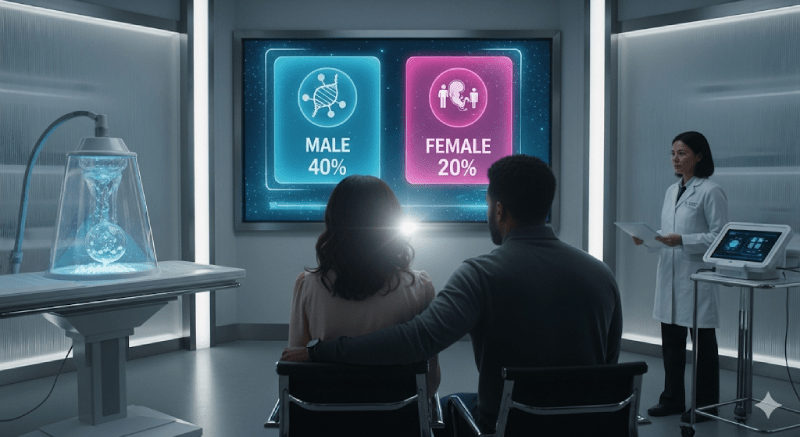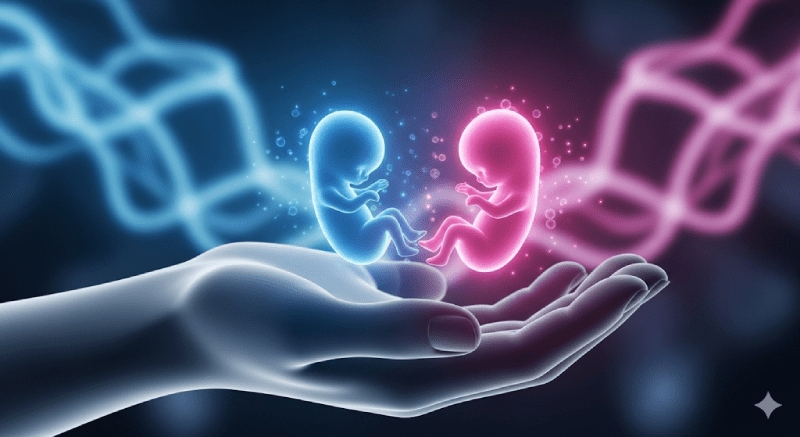Introduction: The Importance of the Topic and the Guide’s Purpose
The desire to have a child is one of the most significant milestones in the lives of many couples. The challenges encountered on this journey, especially complex processes like In Vitro Fertilization (IVF) treatment, can place a profound emotional, ethical, and financial burden on couples. As part of this process, the issue of gender selection comes to the forefront, requiring particular sensitivity in countries like Germany, where legal regulations are extremely strict. This guide aims to address Germany’s unique and restrictive approach to this topic in all its dimensions and to provide users with the necessary information to make informed decisions.
This report does not merely provide superficial information; it offers a comprehensive synthesis based on legal documents such as the German Embryo Protection Act, official data from the Deutsches IVF-Register (DIR), academic publications, and current clinical practices. The goal is to provide users with a complete picture from legal, medical, ethical, and financial perspectives, serving as a reliable map on a complex journey. All information presented has been prepared with an accurate, up-to-date, and impartial perspective.
The Legal and Ethical Framework of Gender Selection in Germany
Germany has one of the world’s most stringent legal frameworks in the field of reproductive medicine. This strictness stems from deep philosophical and ethical concerns about the beginning of human life.
A. The German Embryo Protection Act
The Embryonenschutzgesetz, adopted in 1990 , defines the human embryo as an entity whose genetic integrity must be protected. The primary purpose of this law is to prevent the manipulation of human reproductive cells and embryos for commercial purposes or social preferences. The law criminalizes not only gender selection but also practices such as surrogacy, egg donation, cloning, and artificial insemination after death.
The strictness of the law shows an inclination to keep human reproduction as close to the natural process as possible, rather than viewing it as a “selection” or “preference” process. In line with this philosophy, even methods such as Elective Single Embryo Transfer, which involves selecting the embryo with the best developmental potential after artificial fertilization, are prohibited in Germany. This is a clear indication that the legal framework is not only medical but also based on a deep ethical and philosophical foundation aimed at preventing embryos from being considered a “surplus” and subsequently destroyed.
B. PGT and Gender Selection: Legally Permitted and Prohibited Cases
Preimplantation Genetic Diagnosis (PGT) is a procedure for genetically examining an embryo before it is transferred to the uterus. The primary purpose of PGT is to increase the chance of achieving a healthy pregnancy by identifying serious genetic or chromosomal diseases that couples might pass on to their children. In Germany, PGT can only be applied for this core purpose.
However, gender selection is subject to the strict limitations of this law. The law permits gender selection only in exceptional circumstances. This legal exception covers only situations where the prevention of serious sex-linked hereditary diseases constitutes a medical necessity. For example, if there is a risk of a genetic disease carried on the X chromosome and occurring only in male children, a couple may legally be able to select a female embryo. Such a procedure is subject to strict conditions and cannot be performed without the written consent of the relevant ethics committee.
On the other hand, gender selection for social reasons such as family balancing or personal preference is completely prohibited. The German legal system considers this to be
unethical and attaches legal sanctions to it. Sources from other countries that openly list gender selection prices reveal the fundamental reason why pricing for this service is not transparent in Germany. The fact that the cost of PGT is not explicitly stated in the price lists of German clinics is a concrete indicator that this service is not a commercial product but an exceptional procedure offered solely based on a medical indication. This clearly shows that the legal framework directly shapes the marketing and operational strategies of the clinics.
C. Consequences of Violating the Law
In German law, illegal reproductive medicine practices are subject to serious criminal and administrative penalties. A physician who performs an illegal PGT procedure or anyone involved in it may face a prison sentence of up to 1 year or a judicial fine. Furthermore, a person acting in violation of the law may face an administrative fine of up to 50,000 Euros.

The PGT Method and the IVF Process: Medical and Technical Dimensions
IVF treatment is the primary method for performing PGT, which includes gender selection. This process consists of a series of meticulously followed steps.
A. IVF Treatment Steps
The IVF process aims to replicate a natural cycle in a laboratory environment to achieve fertilization. The steps are as follows:
- Cycle Monitoring and Hormonal Stimulation: In the first stage of the treatment, the woman’s menstrual cycle is closely monitored. The goal is to stimulate the development of multiple follicles (egg sacs) in the ovaries at the same time using drugs such as Follicle-Stimulating Hormone (FSH).
- Egg Retrieval (
Follicular Puncture): Once the eggs reach sufficient maturity, they are retrieved using a needle under transvaginal ultrasound guidance with a short-term anesthetic. - Sperm Collection and Fertilization (
Fertilization): On the day the eggs are retrieved, a sperm sample from the man is prepared with special procedures. Then, the egg and sperm cells are combined in a laboratory environment to initiate the fertilization process. In advanced methods likeIntracytoplasmic Sperm Injection(ICSI), a selected sperm is injected directly into the egg cell. - Embryo Development and Transfer: The fertilized eggs are monitored in the laboratory for several days until they become embryos. Generally, two to five days after fertilization, the healthiest embryos are selected and transferred to the uterus using a thin catheter.
B. Application of PGT
PGT is performed as part of the IVF process mentioned above.
- Biopsy Stage: When the embryo reaches the blastocyst stage, which is about five days old, it is ready for a genetic biopsy. At this stage, the embryo has more than 100 cells, and the cells that will form the placenta (
trophectoderm) and the fetus have differentiated. The biopsy is taken from the cells that will form the placenta. - Genetic Analysis: The retrieved cells are analyzed to detect the presence of genetic and chromosomal abnormalities. The gender of the embryo can also be determined at this stage. This analysis usually takes 24 hours.
- Embryo Transfer: The embryos that are determined to be genetically healthy after the analysis and whose gender is appropriate in cases of medical necessity are transferred to the mother’s uterus.
While PGT technology makes significant contributions to human health by preventing serious diseases as a genetic screening technique , it is also a tool that can be used for
social gender selection, which leads to ethical debates. This dilemma forms the basis of Germany’s strict legal regulation. The legal framework acknowledges this dual nature of the technology and makes it available for use only for the first purpose, which is for the benefit of humanity.
C. Physical Risks and Safety of PGT
IVF and PGT processes carry certain risks, as with any medical intervention.
- Risk of Damaging the Embryo: It is stated that a properly performed
trophectoderm biopsydoes not damage the embryo or reduce its chance of implantation. In experienced centers, these risks are minimized. - Risks for the Individual: The egg retrieval procedure, being a minor surgical intervention, carries rare risks such as internal bleeding or infection. Hormonal drugs can cause side effects such as headaches, fatigue, mood swings, and discomfort at the injection site. Ovarian Hyperstimulation Syndrome (OHSS) is a more serious complication of hormonal therapy.
Advantages and Disadvantages of Gender Selection: A Multi-faceted Assessment
Gender selection, which is legally possible in Germany only for medical reasons, includes both benefits and serious risks.
A. Advantages (Medical and Health-Oriented)
- Prevention of Sex-Linked Genetic Diseases: This is the only legal justification for gender selection in Germany, and it enables couples to protect their children from genetic diseases. This can be a great source of psychological relief for families.
- Increasing IVF Success Rates: PGT enables the selection of the highest quality and genetically healthy embryos, thereby increasing pregnancy rates, reducing the risk of miscarriage, and easing the financial and emotional burden of repeated unsuccessful attempts.
B. Disadvantages and Risks
- 1. Physical and Medical Risks: Hormonal treatment and egg retrieval can cause various side effects, from headaches to nausea, and, in rare cases, serious medical complications (OHSS).
- 2. Psychological and Emotional Effects: The IVF treatment process is already a source of intense stress. Studies show that the levels of anxiety and depression experienced by women struggling with infertility can be similar to those of women diagnosed with cancer or HIV. Failure in a process entered with the expectation of gender selection can multiply this stress and increase the pressure on couples. Furthermore, feelings of worthlessness and burnout are common among couples. This high level of anxiety and stress can also negatively affect the success rate of the treatment.
- 3. Ethical and Societal Debates: Germany’s strict legal approach takes a stand against the ethical problems that gender selection would bring. The main problems are the deepening of gender inequality that could arise from a preference for a certain gender in society and the destruction of healthy embryos of the
unwantedgender. The main purpose of the law is to protect couples from such ethical dilemmas and potential social pressures.
V. Cost Analysis and Financial Assessment
In Germany, IVF treatment can be supported under certain conditions by both statutory health insurance (GKV) and private health insurance (PKV). However, gender selection costs have a special nature due to their legal status.
A. IVF/ICSI Costs and State Support
Statutory health insurance (GKV) covers 50% of the treatment costs for married couples. Certain conditions must be met to benefit from this support :
- The couple must be married.
- The woman must be between 25 and 39 years of age, and the man must be under 49.
- Infertility must be medically diagnosed.
- Only the couple’s own eggs and sperm can be used.
With state support, the co-payment that the patient has to pay for one treatment cycle is approximately 1,500 Euros for IVF and 1,700 Euros for ICSI. These costs may also include medication expenses.
B. PGT and Additional Services Costs
The cost of PGT is not explicitly stated on the websites of German clinics. The reason for this is that PGT is not a commercial service, and the cost is an exceptional case determined only after medical indication and approval by an ethics committee. This means that pricing is not transparent and this service is not marketed outside of a medical necessity.
In addition to the general cost of treatment, some services are not covered by the GKV. These additional services and their estimated costs are as follows:
Cryopreservation(embryo freezing) is approximately 400 Euros.Assisted Hatchingis approximately 170 Euros.
The table below summarizes the cost distribution of IVF treatment in Germany:
| Treatment Type | State Support (GKV) Conditions | Estimated Patient Co-Payment (Euro) |
| IVF | Yes (50%) | 1,500 |
| ICSI | Yes (50%) | 1,700 |
| Medication Costs | Yes (50%) | Variable (average 800) |
| Additional Services | ||
| Embryo Freezing | No | ~400 |
| Assisted Hatching | No | ~170 |
This table provides users with a financial roadmap, showing not only the basic costs but also the conditions of state support and the extras, thereby facilitating the decision-making process.
International Comparison and Alternative Paths
Germany’s strict stance in the field of reproductive medicine contrasts with that of many other countries. Countries that permit gender selection for social reasons offer important alternatives, especially for situations where personal preferences such as family balancing are prioritized.
- Cyprus: It is a popular destination that allows gender selection for family balancing with
MicroSortand PGT methods. - United States: There is no legal prohibition at the federal level in the U.S., and most clinics perform gender selection based on personal preference.
- Mexico: It has become a preferred alternative in recent years due to its low costs and flexible legal regulations.
The advantages of these alternative paths are legal freedom, transparent pricing, and potentially lower costs. The disadvantages include legal ambiguities, ethical concerns, and the difficulty of post-treatment follow-up.
The table below summarizes the key differences between Germany’s position on gender selection and other countries with more flexible regulations:
| Criterion | Germany | Cyprus/USA |
| Legal Status | Prohibited except for serious genetic diseases | Permitted (open to the family’s personal preference) |
| Justification for Application | Only medical necessity (sex-linked genetic diseases) | Medical necessity and/or family planning/personal preference |
| Method | PGT (Prohibited) | PGT and MicroSort |
| Estimated Cost | Not specified (legally prohibited) | Starting from 3,200 Euros (in Turkey) |
| Success Rate | General IVF success rate is high (41%) | 70-80% for MicroSort |
This comparison clearly shows that this service is not possible in Germany and that international alternatives should be considered for targeted social gender selection.
Conclusion: Assessment and Roadmap
While Germany has a world-class level in terms of IVF technology and clinical success rates , it maintains a strict legal and ethical stance on gender selection. Gender selection based on family balancing or personal preferences is strictly prohibited under German law, and this prohibition reflects a fundamental philosophical stance against the manipulation of human life for commercial or arbitrary purposes.
This situation requires a clear roadmap for couples considering gender selection. Experts recommend the following steps to manage this difficult process:
- Accessing Correct Information: The first step is to get information from reliable sources, such as the information provided in this guide, and to understand that the legal situation in Germany is without exception.
- Medical and Psychological Counseling: The IVF process can create intense stress due to expectations and potential failures. It is critically important to get both medical and psychological support during this process.
- Understanding Legal and Ethical Boundaries: If couples are seeking gender selection for personal preference rather than a medical necessity, they must know that this procedure is not legal in Germany. This requires seeking legal advice and evaluating countries with more flexible legal regulations as alternatives.
- Evaluating Alternatives: If the goal is definitively social gender selection, countries where this service is legally and ethically possible should be examined in detail with all their advantages and disadvantages. This report aims to clearly demonstrate that this service is not possible in Germany, thereby helping couples to direct their time, effort, and financial resources correctly.
IVF and Gender Selection: A Step Closer to Your Dreams
Becoming a parent is one of life’s most precious experiences. However, sometimes we face unexpected challenges on this path. Thanks to the miraculous solutions offered by modern medicine, reaching your dreams is now much easier. In vitro fertilization (IVF) treatment helps many families welcome the child they’ve been longing for. But what if you wish to complete your family with the boy or girl you’ve always dreamed of?
In Germany, the IVF and gender selection treatment offered with the distinction of Cure Holiday provides you with a unique opportunity to turn this dream into reality. In our clinics, equipped with expert doctors and state-of-the-art technology, we serve you with the highest success rates.
Why Germany and Cure Holiday?
- High Success Rates: Clinics in Germany have world-class success rates in IVF treatment.
- Latest Technologies: Your treatment is performed using the most advanced genetic screening methods, such as PGT (Preimplantation Genetic Testing). This not only allows for gender selection but also checks the genetic health of the embryo.
- Confidentiality and Security: Your privacy and personal information are treated with the utmost importance throughout your treatment.
- Comfortable Treatment Process: At Cure Holiday, we make your treatment journey as comfortable as possible. We handle all the details, from your accommodation and transportation to post-treatment city tours. You just focus on this important process.
The IVF and Gender Selection Treatment Process in Germany
The treatment plan is customized for each individual. The first step is a comprehensive consultation and medical evaluation. Based on this evaluation, the most suitable treatment protocol is determined for you.
- Egg and Sperm Retrieval: Eggs obtained by stimulating the ovaries and a sperm sample from the father-to-be are combined in a laboratory setting.
- Embryo Development: The resulting embryos are carefully monitored in the laboratory.
- Gender Selection (PGT): Among the developing embryos, those that are genetically healthy and of the desired gender are selected.
- Transfer: The selected healthy embryo is transferred into the mother’s uterus.
We are here to guide you in the best possible way on this journey to your dreams. Contact Cure Holiday to learn more about this special treatment in Germany. Maybe your next Cure Holiday will be the most meaningful journey of your life!



